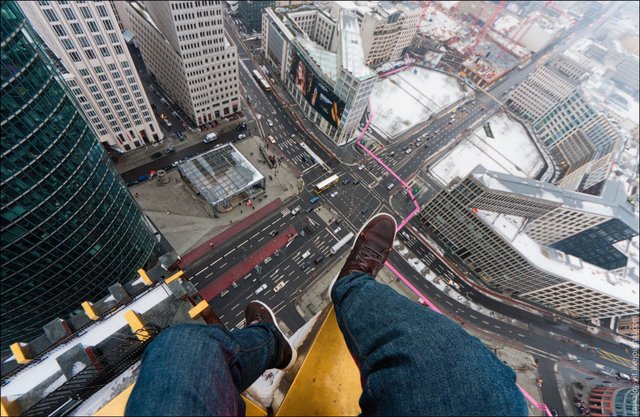It is natural to feel certain uneasiness if we are many meters high, something that can happen when, for example, we climb an elevation where we run a certain risk of falling into the void if we are not careful, or if the surface we walk on is unstable. In those cases it is more a question of prudence and common sense. However, there are people unable to perform daily actions such as climbing a ladder, lean out a window, walk on a bridge or lean out to a viewpoint. They suffer from acrophobia, a term by which fear of heights is known and which, like any other phobia, can come to condition the life of those who suffer it.
Acrophobia goes beyond the impression that it can cause to be away from the ground. It is an irrational and disproportionate fear of heights that is based on a pathological fear of falling and dying. This disorder has negative physiological and psychological effects, to the point that if it is not controlled it can even paralyze a person. Therefore, those who suffer from it tend to avoid any situation that implies being in a high position.
It is one of the most common phobias in the world, and it is estimated that between three and five percent of the world's inhabitants suffer acrophobia to a greater or lesser extent. The experts have not drawn a concrete profile of the people who develop this disorder, but point out that young people and women are more likely to suffer from it.
Do not confuse acrophobia with vertigo
Although they can keep a certain relationship, do not confuse acrophobia with vertigo. The first is the fear of dying if you fall from a height where you are located, while vertigo is a sense of movement of the objects that we have around us. It is an illusion, and not an obsession, such as fear of heights.
Vertigo is a pathology derived from alterations in the inner ear, which is associated with loss of balance. In addition, it appears at any time and does not necessarily imply being located in a high place; It can happen while walking, or even if you remain seated in a chair. Therefore, vertigo and acrophobia are not synonymous.
Both disorders are linked, however, when the feeling of imbalance is compounded by the fear of rushing from above. In that case this disturbance is known as "vertigo of the heights".
Acrophobia is an exaggerated and irrational fear of heights that is based on a pathological fear of falling and dying. In some cases, it can condition the affected person's life and require psychological treatment.

Now I know am acrophobic. Mere looking at the picture scares me a lot!
Downvoting a post can decrease pending rewards and make it less visible. Common reasons:
Submit
I believe I suffer from the syndrome. the height I have dread... Regards :)
Downvoting a post can decrease pending rewards and make it less visible. Common reasons:
Submit
Por experiencia propia,te puedo decir que la sensación de miedo a las alturas es fuerte, te felicito por este buen trabajo, me gustaria tu visita, saludos
Downvoting a post can decrease pending rewards and make it less visible. Common reasons:
Submit
Gracias amigo. Saludos
Downvoting a post can decrease pending rewards and make it less visible. Common reasons:
Submit
Congratulations! This post has been upvoted from the communal account, @minnowsupport, by jesus93 from the Minnow Support Project. It's a witness project run by aggroed, ausbitbank, teamsteem, theprophet0, someguy123, neoxian, followbtcnews, and netuoso. The goal is to help Steemit grow by supporting Minnows. Please find us at the Peace, Abundance, and Liberty Network (PALnet) Discord Channel. It's a completely public and open space to all members of the Steemit community who voluntarily choose to be there.
If you would like to delegate to the Minnow Support Project you can do so by clicking on the following links: 50SP, 100SP, 250SP, 500SP, 1000SP, 5000SP.
Be sure to leave at least 50SP undelegated on your account.
Downvoting a post can decrease pending rewards and make it less visible. Common reasons:
Submit